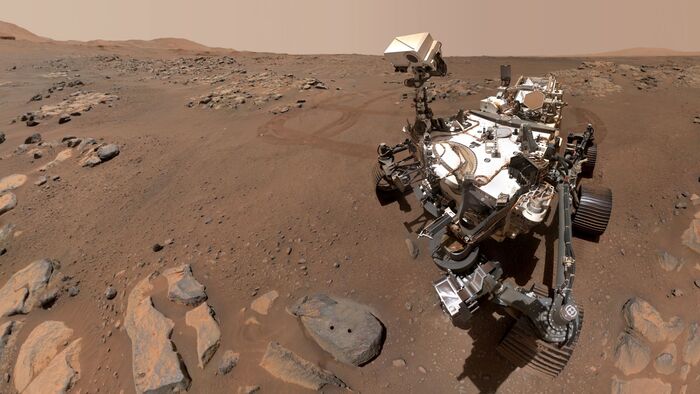The Perseverance rover has taken a major step in its search for traces of ancient life on Mars.
The robot has collected samples, "the most valuable" so far, containing potential biosignatures that will have to be confirmed once on Earth, NASA announced Thursday.
This is not yet proof that life once existed on the Red Planet, but the best chance so far of one day being able to detect with certainty possible ancient microbial life.
In #SamplingMars, I'm building a real science treasure chest, and my latest samples may be the most valuable yet.
Some have organic molecules – but from ancient biology, or another process?
Sending them back to Earth could help us figure it out.
More: https://t.co/sn5Wh9fRnG pic.twitter.com/GfMaXPrYnd
— NASA's Perseverance Mars Rover (@NASAPersevere) September 15, 2022
A potential biosignature may have been produced by the presence of life, but also in the absence of life.
To consider this biosignature as definitive, these samples will have to be analyzed by powerful laboratory instruments on Earth.
NASA plans to bring them back, through another mission, by 2033. "I think it's fair to say that these are going to be, and are already, the most valuable rock samples never collected,” said David Shuster, who is working on these samples, at a press conference.
“Exactly what we came for”
Two cores were taken by drilling in a rock called "Wildcat ridge", about one meter high and located in a delta that formed about 3.5 billion years ago, at the meeting of a river and an old lake.
This rock is particularly interesting because it is a sedimentary rock, which seems to have formed when the water in the lake evaporated.
"Wildcat ridge" thus has "high potential for the conservation of a biosignature", declared David Shuster, of the University of California at Berkeley.
Analyzed separately by an instrument at the end of Perseverance's robotic arm, the rock revealed the presence of organic compounds - the most abundant detected since the start of the mission a year and a half ago.
These compounds - made in particular of carbon, and which can also contain hydrogen - "are the basic elements of life", declared Ken Farley, in charge of the scientific part of the mission.
Read also“Dreams of Mars”: exploring time, searching for life
They were detected in smaller quantities by the rover during previous analyzes in the crater of Jezero, which contained the lake, but "as we progress in the delta, the clues become stronger and stronger", summarized Sunanda. Sharma, a scientist at NASA's Jet Propulsion Laboratory.
“I personally find these results very moving, because it seems that we are in the right place, with the right instruments, at a pivotal moment,” she said.
"We don't yet know the significance of these finds, but these rocks are exactly what we came for," Farley concluded.













